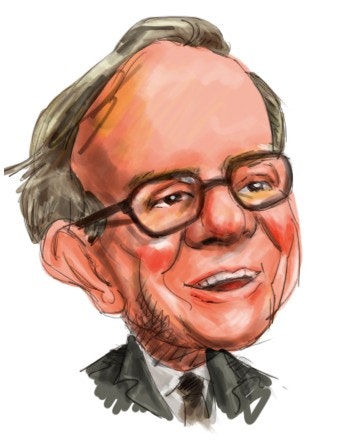Tesla Motors Inc (NASDAQ:TSLA) is a company that generated much hoopla when it debuted because of the niche product it was offering. It created even more buzz when it went public; so much so that its price the day of the IPO was above its target price.
If you are considering investing in Tesla Motors Inc (NASDAQ:TSLA), but you have doubts, consider one of the most trusted methods investors use in determining worthy investments. This method is commonly called the “Warren Buffett Way.” Apply the principals of this method and ask yourself, would Tesla Motors Inc (NASDAQ:TSLA) be included in as a Berkshire Hathaway position?
Here’s a full list of Buffett’s stock holdings.
Before going into the principles of the Warren Buffett Way, let’s review Tesla Motors Inc (NASDAQ:TSLA). Founded by Elon Musk in 2003, the company’s niche is building high-end autos that are powered by electricity. You may recall the first electric cars to enter the market; they were nothing to be excited about as far as being aesthetically pleasing to the eye. The length of time you could drive the car without charging it also left more to be desired.
Musk, who is the chairman and CEO of Tesla Motors Inc (NASDAQ:TSLA), sought to change the image of electric vehicles, and to his credit, he did just that. Under his watch, Tesla Motors Inc (NASDAQ:TSLA)’s models include the Roadster, the Model S sedan and the Model X SUV. Automobile Magazine named the Model S its “Car of the Year,” citing its design and impressive speed.
Return on investment
With that being said, let’s look at how Tesla stacks up when it comes to one of the principles of the Warren Buffett’s Way – return on investment. The theory is based on how much of a return there is on invested capital. In Tesla’s case, this needs improvement; it is -72.22%. Remember, this indicator measures the strength and historic growth of a company’s return on invested capital. TheStreet Ratings recently ranked Tesla at the bottom of companies it reviews for income generated per dollar of capital.
EPS
Also part of the Buffett Way’s valuation of a stock is the company’s earnings per share. Tesla’s EPS for the fourth quarter missed estimates, coming in at $.65, which amounted to a lost of about $75 million. A bright spot were sales, which totaled about $306 million.
Tesla execs at that time tried to mitigate the dismal earnings results by saying that the company expected to turn a profit during the first quarter ended March 31. Making a profit would be huge for Tesla considering it’s never done so. Its full year losses climbed to $396 million last year from $254 million in 2011.
Tesla’s next earnings release is slated for May and it will cover the first quarter ending March 2013. The market will be looking to see if Tesla will be able to reverse its trend of declining earning per share, which has plagued it for the past two years. Consensus estimates suggest that this will happen. According to Zacks Investment Research, based on four analysts’ forecasts, the consensus EPS forecast for the quarter is $-0.17. The reported EPS for the same quarter last year was $-0.86.
Niche versus the giants
A challenge that Tesla faces is being able to compete in a space that is becoming increasingly more competitive. As mentioned above, consumers’ palate for electric vehicles has been slow to develop. Determined to change that, car industry well-known automakers, such as General Motors Company (NYSE:GM), Nissan Motor Co., Ltd (NASDAQOTH:NSANY), Ford Motor Company (NYSE:F) and Toyota Motor Corporation (ADR) (NYSE:TM) have all entered the space. General Motors Company (NYSE:GM) and Nissan Motor Co., Ltd (NASDAQOTH:NSANY) hit the ground running with their electric vehicles in 2011, with their Chevy Volt and Nissan Leaf. Toyota Motor Corporation (ADR) (NYSE:TM) is making its presence known with the Prius, and it reportedly has plans an all-electric RAV4 mini in the works. Their sales have not been particularly strong. Ford Motor Company (NYSE:F)’s EV model is the Electric.
According to Trefis, the electric vehicle market makes up around 1.9% of the total passenger car market. By 2020 that could grow to 10%. So that’s clearly not a huge market to sell to, which increases the chances that Tesla has its work cut out for it to improve its fundamentals and be a viable long-term investment.
The shorts
Also consider this: one of the gauges that can be used to get an idea of investor sentiment is the percentage of those shorting the stock. In Tesla’s case, that percentage was 44.51% at the time of writing, meaning that investors are betting against the long-term success of the company. Since the IPO, the company has kept a high ranking of being one of the most shorted stocks on the NASDAQ.
By comparison, GM sports a short percentage of float near 7%, while Ford’s is even lower, below 2%. Data for Nissan and Toyota is not available, but it’s worth noting that both trade at valuation metrics about half that of Tesla.
The valuation
Nissan, for example, currently has a forward earnings multiple near 16.0x, while Toyota trades at just below 14 times year-ahead EPS. Tesla, meanwhile, a forward P/E ratio above the 30.0 mark, but annual EPS growth is expected to average 46% a year over the next half-decade.
When compared to all of its peers in the major auto manufacturers industry, Tesla comes in second, behind Wall Street’s EPS estimates for Nissan, at about 61% growth annually. Understandably, Tesla trumps the competition that matters the most: GM and Ford. Both automakers see EPS growth expectations above 16%, and Toyota’s is better, but still five percentage points below Tesla.
GARP play?
With that being said, it’s clear that Tesla is a momentum play that fits the role of “growth stock” at the present time. Without moderately attractive multiples, no value investors would be caught dead invested in Tesla, even from a GARP standpoint.
As you’re probably aware, GARP stands for “Growth at a Reasonable Price,” and in Tesla’s case, its growth comes at a PEG ratio of 5.35. This is way overvalued, clearly.
Not a Buffett pick
Based on this, one would likely conclude that Tesla would not be a worthy investment for billionaire Buffett. Yes, the company is led by a CEO who was a driving force behind the hugely successful PayPal. However, there are so many factors that challenge the company that it is hard to think it is a viable long-term investment. Sleek, beautiful electric vehicles have their place in the automobile market, but this stock has no place in your portfolio if you go by the Warren Buffett Way of investing.
Disclosure: none



